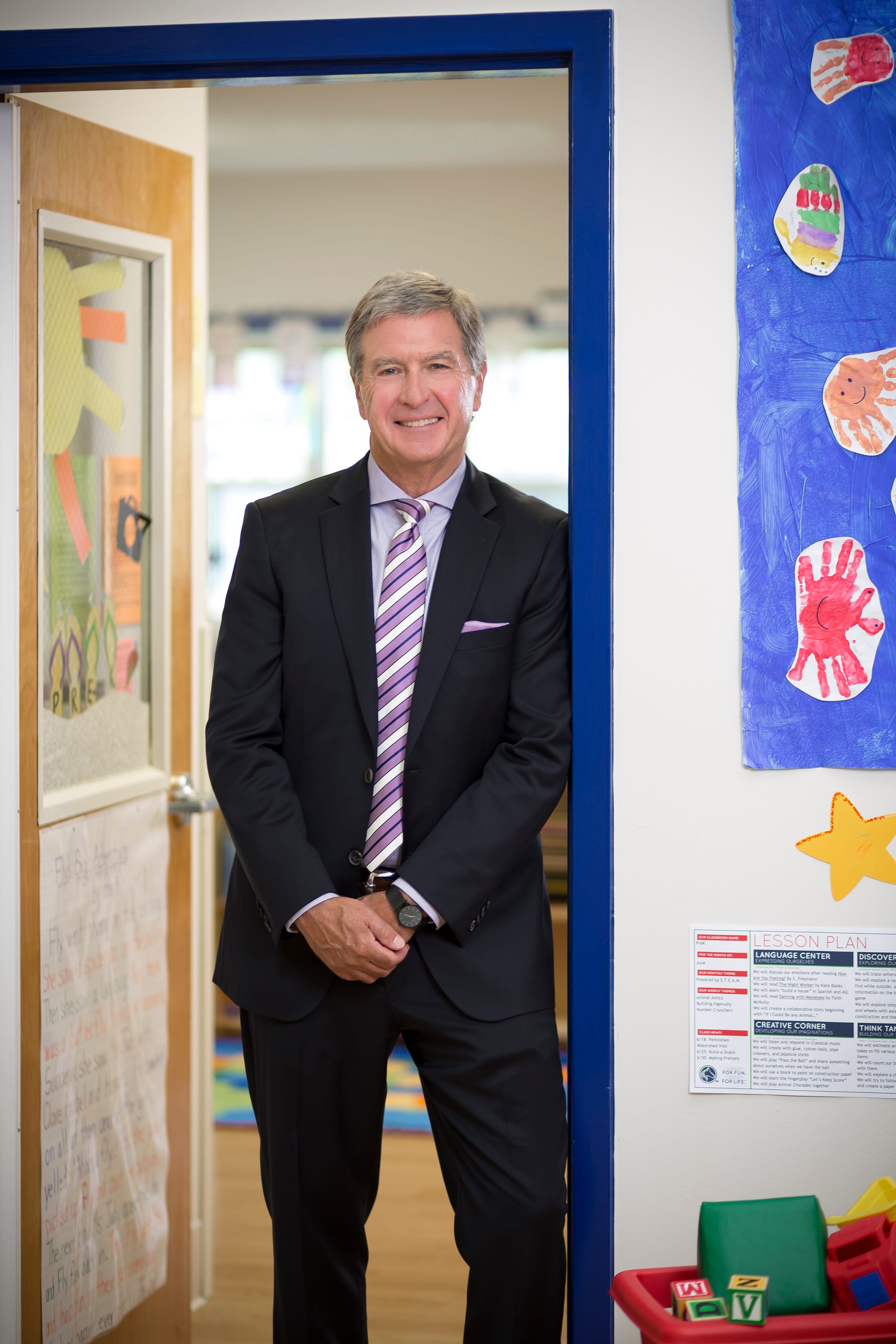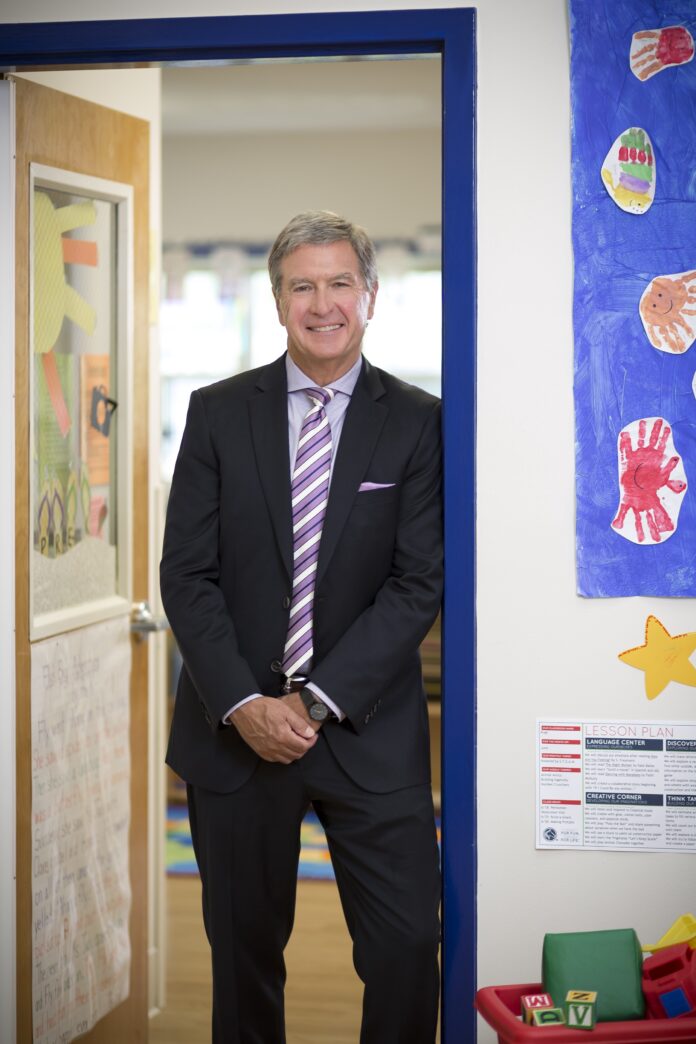“Failure is an option. Failure is generally stigmatized, but it can be an important opportunity to learn and grow. Assuming everyone is exercising good judgment, if a project or idea doesn’t work out as planned, failures should be seen as teachable moments. Companies and people need to take risks to grow.”
I had the pleasure to interview Joe Schumacher, CEO of Goddard Systems. Founded in 1988, The Goddard School offers a dynamic learning through play approach to early childhood education that builds each child’s emotional, academic, social, creative and physical skills. The curriculum is designed to teach and reinforce 21st Century skills via STEAM (science, technology, engineering, arts and mathematics) learning. With jobs in related fields being the fastest growing segment of the U.S. economy, introducing these concepts to children early on will help to develop a strong foundation and passion for STEAM.
What is your “backstory”?
I started in franchising at MAACO Enterprises, an auto repair franchise, first as a training instructor and later in various management positions, under the mentorship of my brother in-law, Tony Martino. Tony founded the AAMCO Transmissions, MAACO and Goddard School franchises.
Ultimately, I went to law school at night while working as MAACO’s Director of Legal Administration. After law school, I spent a year as MAACO’s Corporate Counsel before going into private practice. In private practice, I represented franchised brands such as McDonald’s, Auntie Anne’s, MAACO, GNC and Goddard School. The Goddard system became a true family business for me when my brother Phil joined the company in 1992, and became CEO in 1996. As Goddard’s lawyer, I worked directly with Phil; we grew the brand together and private investor Wind River Holdings bought the system in 2002.
After 20 years in private practice, in 2007 I decided to leave my law practice and join my brother, becoming Chief Operating Officer for Goddard Systems, Inc., Franchisor of The Goddard School (GSI). My legal experience had given me a wealth of information for my new position. I had gained valuable insights into the franchise model, especially the nuances of the franchise relationship. When my brother retired in 2009, I was appointed CEO of GSI.
As CEO, I am responsible for overseeing the continued growth and development of our preschool system, which is rapidly approaching 500 locations across the U.S.
Can you share the funniest or most interesting story that happened to you since you began leading your company?
What I consider the most pivotal moment in my Goddard career was shortly after I became CEO. GSI was experiencing growing pains moving from a small, entrepreneurial business to a professionally managed franchise system. There was initially some resistance to these changes, and company morale was low. I did an employee survey asking for feedback that we could use to make meaningful and productive changes.
The results of this survey were concerning. There were numerous negative comments; many directed at me personally. I took each of these into consideration, and at a company-wide meeting I read many of the negative comments aloud and candidly addressed the concerns one by one.
In retrospect, this was an inflection point for both the company and for me. Many employees later told me that my willingness to address those criticisms publicly ultimately helped them trust me to lead the company. Since that moment, we’ve become a much different company, we continuously seek feedback from both employees and franchisees and we’ve grown together in the process.
So what exactly does the Goddard School do?
The Goddard School is a preschool franchise that offers year-round programs for children six weeks to six years old, including enrichment, summer and before- and after-school programs for slightly older children. GSI has more than 470 franchises in 37 states. Each School is a licensed childcare facility with an on-site franchisee, an education director and a faculty trained in early childhood education and childhood development. The franchisee and education director work together to ensure every family enjoys a warm, positive experience. Franchisees focus on the operational aspects of the business, while education directors focus on the curriculum, programming and teacher development. No prior teaching or childcare experience is necessary to own a Goddard School.
The Goddard School specializes in play-based learning and focuses on building each child’s emotional, academic, social, creative and physical skills to provide a well-rounded experience and help each student become school ready, career ready and life ready.
What do you think makes your company stand out? Can you share a story?

2018 will mark The Goddard School’s thirtieth anniversary. Since The Goddard School’s inception in 1988, we’ve had the unique opportunity to benefit the lives of hundreds of thousands of children, their families and their communities.
One of our key differentiators is our Educational Advisory Board (EAB), a knowledgeable group of educators, researchers and experts in child development, early learning, technology integration, brain development, parent engagement and health and nutrition. The EAB evolves and shapes The Goddard School’s play-based learning program by putting research into action and empowering children to become school ready, career ready and life ready.
We also stand out in the early childhood education space by offering our F.L.EX.® Learning Program (Fun Learning Experience), a curriculum grounded in research on how children learn best when they are having fun. This comprehensive, play-based approach provides the best environment for children’s cognitive, emotional, physical and social development, helping Goddard School students become confident, joyful and fully prepared for success in school and in life.
The curriculum also incorporates STEAM learning (science, technology, engineering, arts and mathematics) into exciting, fun experiences for children. Introducing these STEAM concepts early helps children develop essential creativity and innovation skills and the abilities to collaborate, communicate and think critically.
Finally, we have outstanding employees who are passionately dedicated to supporting our system of extraordinary franchisees.
None of us are able to achieve success without some help along the way. Is there a particular person who you are grateful towards who helped get you to where you are?
Tony Martino. He was my client for many years, but he was also my mentor, both professionally and personally. He offered me unwavering support and encouragement; especially as I went to law school at night. I’m sure I wouldn’t be in the position I’m in today if it weren’t for Tony.

How have you used your success to bring goodness to the world?
Growing the system across the U.S. allows us to come together as a franchise system during difficult times and give to those in need on a larger scale. As a community, we all try hard to give back.
One of my proudest moments as CEO of GSI occurred recently when our system, through our Goddard Cares program, worked together to collect more than $100,000 to aid those affected by hurricanes Harvey and Irma. Seeing the entire system work together to help those in need was incredible.
What are your “5 Things I Wish Someone Told Me Before I Became CEO” and why.
- Give all stakeholders a voice, and listen. This tip goes back to my personal experience with the criticisms I received as a new CEO. Everyone has an opinion, and it’s important to listen because it will ultimately benefit the company.
- Hire the best people you can find, and then get out of their way. Micromanaging will only discourage your team. The best way to help your employees develop into confident leaders is to allow them the freedom to use sound judgment to make their own decisions. This leads me to my next point.
- Failure is an option. Failure is generally stigmatized, but it can be an important opportunity to learn and grow. Assuming everyone is exercising good judgment, if a project or idea doesn’t work out as planned, failures should be seen as teachable moments. Companies and people need to take risks to grow.
- The job will be with you 24/7. Even when you’re not working, work-related thoughts will occur to you at weird times. Let this happen. Sometimes your best ideas occur at the most unexpected times.
- Find ways to relax and escape. For me, it’s exercising, reading and listening to music. I just finished Between the World and Me by Ta-Nehisi Coates. It’s one of the most exceptional and important books I’ve ever read.
Some of the biggest names in Business, VC funding, Sports, and Entertainment read this column. Is there a person in the world, or in the US whom you would love to have a private breakfast or lunch with, and why?
I’d like to sit down and have a conversation with Michael Timmins of The Cowboy Junkies. I’ve been a fan of the band since their beginning, and he’s such a thoughtful and impressive artist.


